A sparkling swimming pool isn’t just a luxury—it’s a centerpiece of your outdoor space and a haven for relaxation and fun. However, keeping your pool clean and safe requires regular maintenance to ensure it’s always ready for a refreshing dip.
Proper pool cleaning not only improves water quality but also extends the life of your pool’s water features and equipment by preventing buildup and wear. Routine cleaning removes debris, balances chemicals, and protects your pool from potential damage, saving you time and costly repairs in the long run.
For Denver homeowners, Mile High Lifescape is the trusted expert in pool and outdoor maintenance, offering reliable services to keep your pool in pristine condition. Ready to dive into the benefits of a well-maintained pool? Let’s explore how professional cleaning makes all the difference!
Why Is Regular Pool Cleaning Important?
Better Water Quality
One of the biggest benefits of regular pool cleaning is the water quality. Clean water not only looks great but is also essential for keeping swimmers healthy and comfortable. Here’s why regular cleaning matters:
- It removes harmful bacteria and algae that can cause health problems like ear infections or respiratory issues.
- It keeps the water clear, so you can see the bottom of the pool, which is important for safety.
- It prevents skin and eye irritation caused by unbalanced pool water, making swimming more enjoyable.
Longer Pool Life
Regular pool cleaning and maintenance can make your pool last longer:
- Checking and fixing pool equipment like pumps and filters can stop small problems from turning into big, costly ones.
- It helps protect the pool lining from damage, which can happen from chemicals or algae if not properly managed.
- It allows you to catch problems early, like leaks or cracks, before they get worse.
Saves Energy
A clean, well-maintained pool uses less energy. Regular pool cleaning can make your pool more energy-efficient by:
- Making sure the pump and filter systems work as efficiently as possible, so they don’t waste extra energy.
- Ensuring proper water flow, which helps avoid using more energy to keep the pool systems running.
Safer Swimming
A clean pool is a safer pool for everyone:
- It stops algae from growing on the surface, which helps prevent slippery spots where someone might fall.
- Regular pool cleaning gets rid of debris that could hurt swimmers, keeping everyone safe.
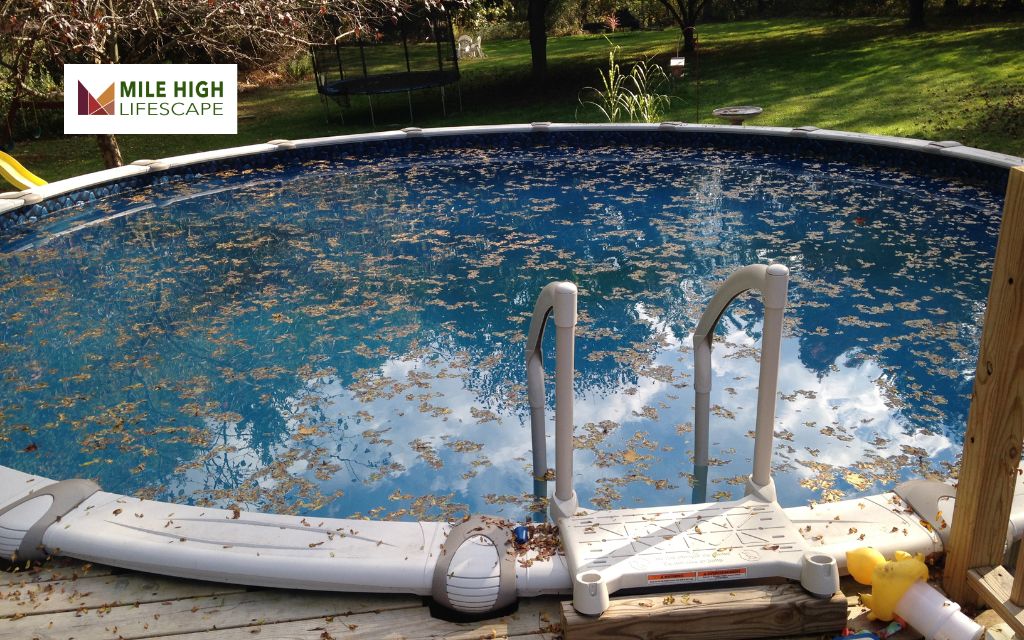
Save Money Over Time
Taking care of your pool now can save you money later. Regular maintenance is an investment that can help you by:
- Stopping small problems from becoming big, expensive repairs.
- Helping pool equipment last longer, so you don’t have to replace it too soon.
- Keeping the water’s chemical balance right, so you won’t need to buy too many chemicals.
Better Look and Feel
A well-maintained pool makes your outdoor space look amazing:
- It keeps the pool area looking fresh and inviting, perfect for a swim or hanging out.
- It can even increase your home’s value because a nice pool is a big plus for potential buyers.
Common Pool Cleaning Tasks
To keep your pool clean, safe, and fun to swim in, it needs regular care. There are a few important cleaning tasks that should be done to keep everything in top shape. Here are some of the most common tasks:
Vacuuming
Vacuuming the pool is essential for removing dirt, leaves, twigs, and other debris from the water. This helps keep your pool’s filtration system from getting clogged. You can use a manual pool vacuum or make it easier with a robotic pool cleaner, which automatically picks up dirt from the pool floor, walls, and waterline.
Brushing and Scrubbing
Brushing your pool is important to get rid of algae, slime, and other buildup that could make the pool dirty or cause bacteria to grow. You’ll need to scrub the walls, steps, and floor, especially the pool steps, which can be slippery if algae builds up. Cleaning these areas helps prevent dangerous falls.
Chemical Balancing
Chemical balancing is a key part of pool cleaning because it keeps the water safe for swimming. You need to make sure that the water’s pH and chlorine levels are just right to prevent bacteria growth. Testing the water at least twice a week is important, and using a digital chemical tester is the best way to make sure your results are accurate.
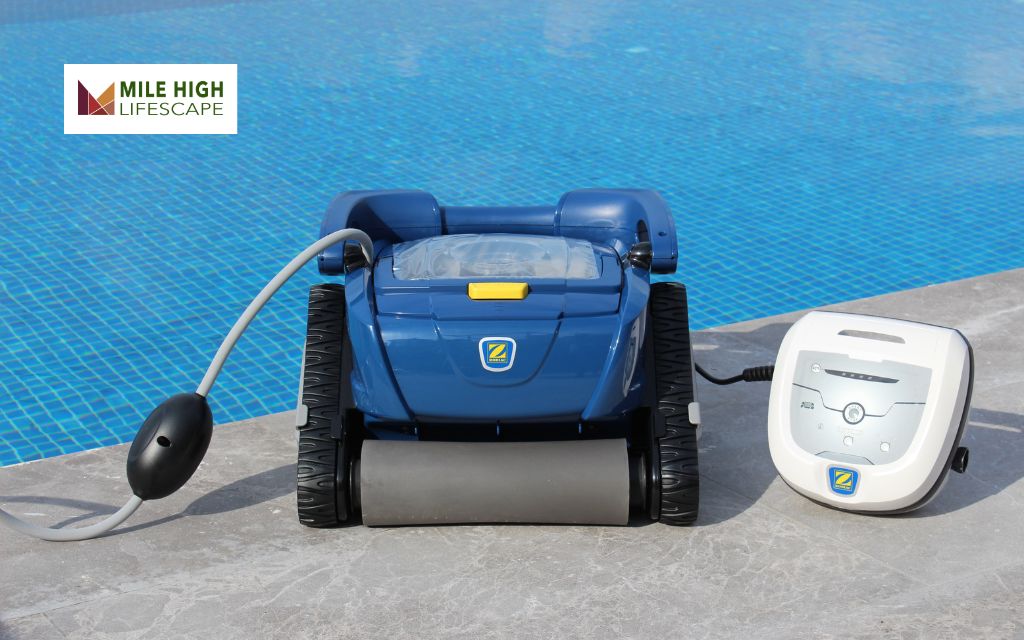
How Often Should You Do Pool Cleaning?
In short, the answer is “Every day!” There’s always something you can do to keep your pool clean and in great shape.
It’s better to take care of small tasks as soon as you notice them, instead of waiting until the weekend. By doing a little bit of cleaning and maintenance every day or throughout the week, you can avoid big piles of work later on.
This way, you won’t feel overwhelmed and your pool will stay in great condition. Regular pool cleaning helps prevent bigger problems and keeps your pool lasting longer and ready to enjoy!
Risks of DIY Pool Cleaning
Owning a pool is a lot of fun and a great way to relax, but it does take work to keep it clean and safe. While doing it yourself might seem like a cheaper option, it can lead to problems if you’re not careful. Here are some things to keep in mind:
Chemical Balance Problems
Keeping the right balance of chemicals like chlorine, pH, and alkalinity is very important. If you use the wrong amounts, it can cause:
- Health Risks: Too much chlorine can irritate your skin and eyes, while too little can let harmful bacteria and algae grow, which could make you sick.
- Equipment Damage: Using the wrong chemicals can damage your pool’s equipment and surfaces. For example, too much acid can rust metal parts, and high alkalinity can block filters.
- Cloudy Water: If the chemicals aren’t right, your pool water might get cloudy or even turn green, making it unsafe and not fun to swim in.
Filtration and Circulation Problems
A clean pool needs good filtration and water movement. If you try to maintain your pool yourself without the right knowledge or equipment, you might miss important steps, like:
- Poor Water Quality: Without proper filtration, dirt and debris can pile up in your pool, making it dirty and unsafe to swim in.
- Algae Growth: Stagnant water can grow algae, which not only makes the pool look bad but can also make surfaces slippery and unsafe.
- Equipment Strain: If you don’t keep the filtration system working well, the equipment can get clogged, which means it will wear out faster and cost more to fix.
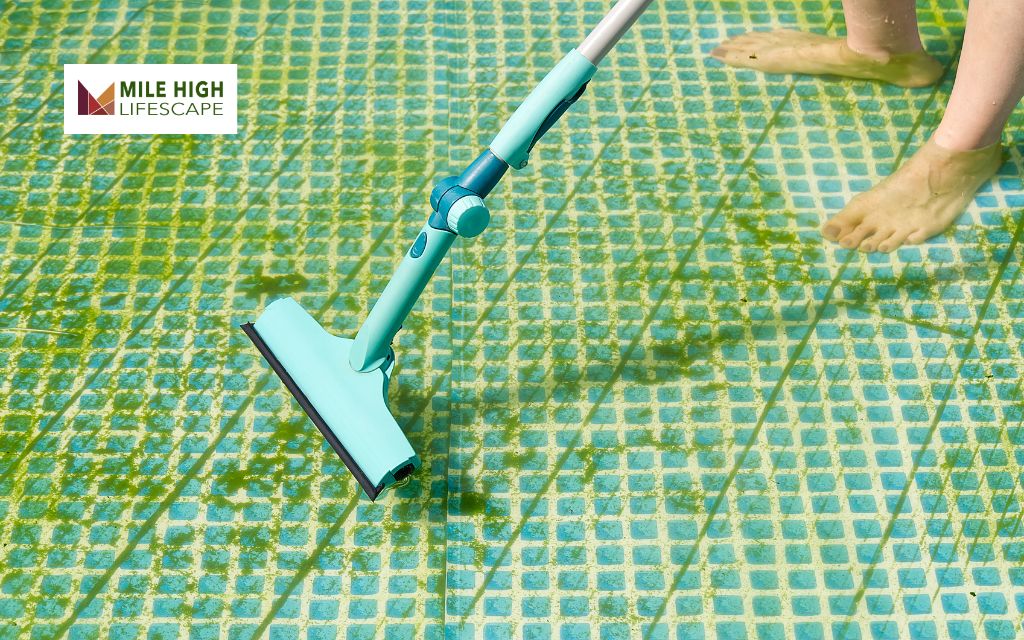
Missing Structural and Equipment Issues
Your pool’s structure and equipment need regular checking to catch small problems early. If you try to do it all yourself, you might miss things like:
- Leaks: Even a small leak can waste a lot of water and damage the pool area, leading to bigger problems.
- Cracks and Damage: Small cracks can get worse over time, making your pool unsafe and causing expensive repairs.
- Equipment Failures: If you don’t check things like the pump and filter, they might break and leave you with no way to properly clean your pool.
Benefits of Hiring Professional Pool Cleaning Services
Save Time
Hiring a professional pool cleaning service can save you a lot of time. With someone else taking care of your pool, you won’t have to add it to your never-ending to-do list. You’ll be able to focus on other things that need your attention.
Regular Cleanings
When you hire a professional pool company, they will clean and maintain your pool on a regular basis. This means your pool will always be sparkling clean and safe to swim in. If you try to clean it yourself, you might just skim the surface and empty the skimmer baskets, but you likely won’t vacuum the pool or scrub the walls and tiles, which are important for keeping it hygienic.
Properly Balance Chemicals
Keeping your pool’s chemicals balanced is trickier than it sounds. If you don’t get it right, bacteria and algae can grow in the water, which could make you sick or irritate your skin, eyes, or nose. A professional knows exactly how to keep your pool safe by balancing the chemicals.
Maintain Value
Regular cleaning and maintenance help protect the pool’s equipment and prevent problems like leaks. Without proper care, your pool could start to deteriorate quickly. By hiring a professional, you’re making sure your pool stays in good shape and your investment is protected.
Frequent Equipment Inspection
Another great benefit of hiring a professional is that they will check your pool equipment regularly. They can spot small issues before they turn into big ones, like finding leaks early on or servicing the pump and filter to prevent breakdowns.
Save Money
In the long run, having a professional pool cleaning service saves you money. By catching small problems early, they help you avoid expensive repairs. Plus, they’ll extend the life of your pool equipment, saving you even more down the road.
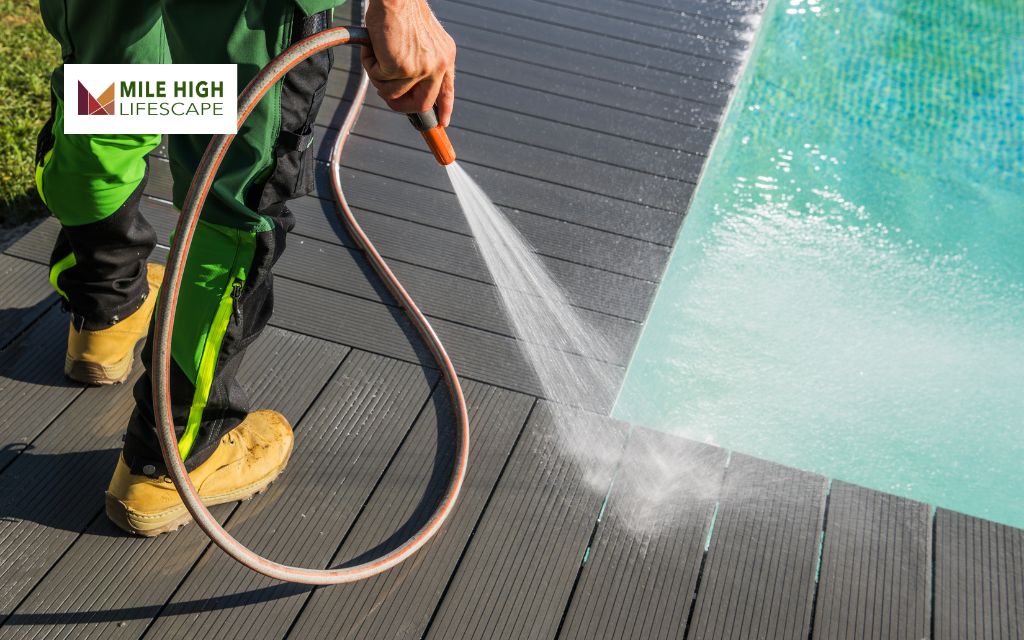
What to Expect from Professional Pool Cleaning Services
Initial Assessment
The first step in pool cleaning is a full check of your pool’s current condition. Professionals look at things like how clear the water is, the balance of chemicals, and the condition of the pool’s surfaces and equipment. This helps them figure out exactly what your pool needs and create a plan to keep it in top shape.
Weekly Maintenance Plans
To keep your pool healthy, regular cleaning is important. Many professional services offer weekly maintenance plans, which typically include:
- Skimming and Vacuuming: Removing leaves, twigs, and other debris from the water’s surface and the pool floor to keep it clean and safe.
- Brushing: Scrubbing the walls and tiles to stop algae from growing and prevent stains.
- Chemical Testing and Balancing: Checking and adjusting the chemicals, like pH, chlorine, and alkalinity, to keep the water clear and healthy.
These tasks are customized based on how much you use your pool and the environment around it, making sure the maintenance is just right for your pool.
Equipment Maintenance
In addition to cleaning, pool maintenance services also take care of important equipment. They inspect and service things like:
- Pumps and Motors: Checking if the water is flowing smoothly and fixing any potential issues.
- Filters: Cleaning or changing filters to keep the water clean and fresh.
- Heaters: Making sure the heater works properly to maintain the right temperature for swimming.
Taking care of this equipment helps it last longer and can catch problems early, so you can avoid expensive repairs later on.
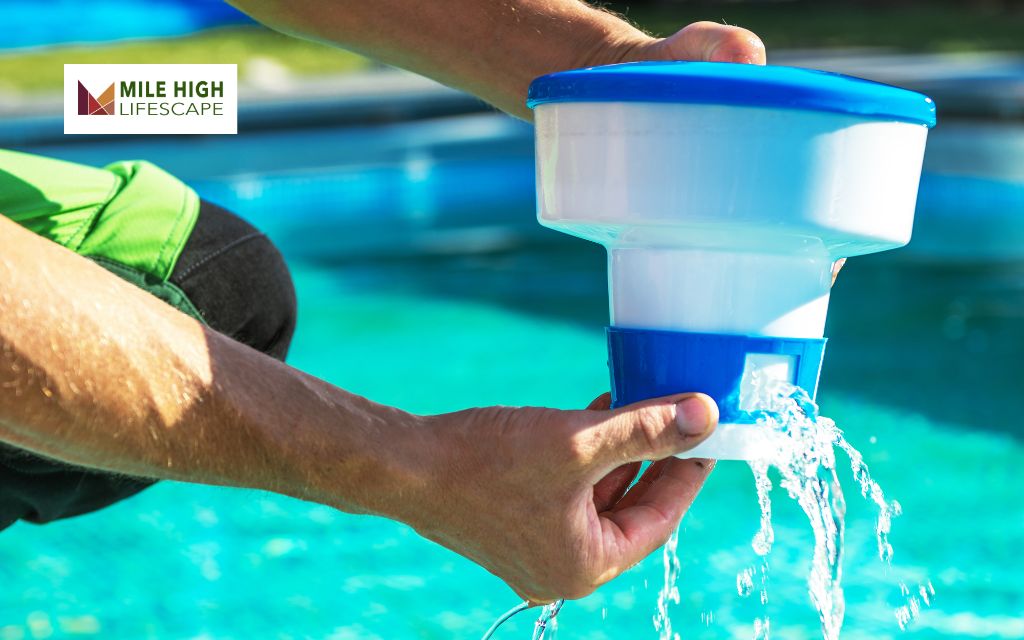
FAQs about Pool Cleaning
What is the best way to clean a pool?
The best way to clean a pool involves doing a few key tasks regularly. First, use a skimmer to remove leaves and debris from the surface. Then, scrub the walls and floor to prevent algae from growing. Vacuum the pool to get rid of dirt that has settled on the bottom, and make sure the water chemicals are balanced to keep the pool safe and clear.
How often should a pool be cleaned?
You should clean your pool at least once a week, but if you can, you should do it every day. This includes skimming, brushing, vacuuming, and checking the water chemicals. If your pool gets a lot of use or there are a lot of leaves and debris around, you may need to clean it more often.
What does cleaning the pool mean?
Cleaning the pool means doing tasks to keep the water clear and safe. This includes removing debris, scrubbing the walls to stop algae from growing, vacuuming the pool floor to pick up dirt, and making sure the chemicals in the water are balanced for a healthy swimming environment.
In what order should you clean your pool?
Here’s the best order for cleaning your pool:
- Skim the Surface: Use a net to remove leaves and debris from the water.
- Brush Walls and Floor: Scrub the surfaces to loosen dirt and prevent algae.
- Vacuum the Pool: Clean the bottom of the pool to remove dirt that’s settled.
- Clean the Filter: Make sure the filtration system is clear and working well.
- Test and Adjust Chemicals: Check the water’s chemical balance and adjust it if needed.
Following these steps in order ensures your pool is clean and ready for swimming.
Conclusion
Pool cleaning is essential for a safe and enjoyable swimming experience. It keeps the water crystal clear, balances chemicals, and prevents algae growth. Regular care also protects pool equipment, saves on energy costs, and extends the lifespan of your pool.
Hiring professionals ensures thorough cleaning and proper maintenance, giving you more time to enjoy your pool without the hassle. Whether it’s daily upkeep or professional help, consistent pool cleaning makes all the difference in keeping your outdoor oasis ready for fun and relaxation. Dive into cleaner waters today!

